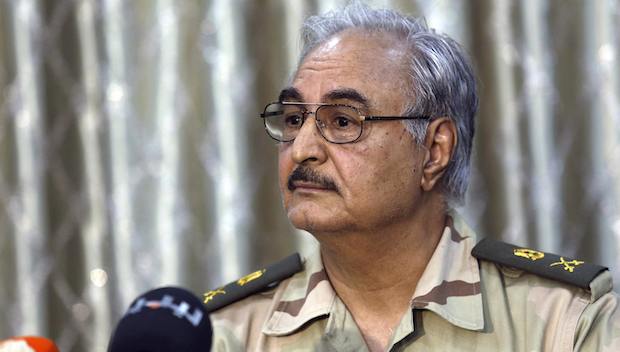
Gen. Khalifa Haftar attends a news conference at a sports club in Abyar, a small town to the east of Benghazi, in Libya, in this May 17, 2014 file photo. (Reuters/Esam Omran Al-Fetori/Files)
Cairo, Asharq Al-Awsat—The commander of the Libyan National Army, Gen. Khalifa Haftar, is operating on the authority of the internationally recognized Libyan government based out of Tobruk, Libyan authorities confirmed this week.
The statement of support for Haftar’s position comes amid speculation over his role in the divided North African state, with reports of divisions within premier Abdullah Al-Thani’s government over Haftar’s role.
In comments to Asharq Al-Awsat, Haftar said: “My basic task is to cleanse Libya of the Muslim Brotherhood,” claiming that the Libyan people have had enough of Islamic extremism.
Haftar announced Operation Dignity in May 2014, targeting Islamist groups in Benghazi. The Libyan National Army’s military operations have now been expanded to include the rival Islamist government and parliament based out of the Libyan capital Tripoli, which was created last year after some groups refused to accept the results of June’s election.
Libya currently has two rival governments. One recognized abroad and led by Thani and based in Tobruk, and another based in Tripoli and composed of members of Libyan’s previous transitional government, the General National Congress (GNC).
On Monday, Reuters reported that the Tobruk-based government had recalled Haftar to army duty, cementing its alliance with him against its rival Islamists, after obtaining a copy of an official decree of the government recalling Haftar and 108 other former Gaddafi-era military officers to active duty. Asharq Al-Awsat first reported of an alliance between Haftar and Thani in late 2014.
Despite affirmations that Haftar’s Libyan National Army forces are operating under the authority of the Tobruk-based government, questions remain as to Haftar’s own role. While Libyan Parliamentary Speaker Ageila Saleh currently holds the role of acting defense minister, the precise details of the chain-of-command of the Tobruk government’s forces remain unclear.
The latest news comes as rival Libyan parties agreed to a second round of peace talks, which are expected to be held sometime next week following a successful first round in Geneva.
Although the Swiss city was also initially given as the venue for next week’s talks, the United Nations Support Mission in Libya (UNSMIL) informed Asharq Al-Awsat that “the National Dialogue will take place on Libyan territory,” in response to demands by the Islamist-led parliament in Tripoli.
“Communications and consultations are ongoing over the venue for the next round of talks,” an UNSMIL official said, refusing to specify what venues in Libya the two sides were discussing. With Libyan territory split between supporters of rival governments, finding a neutral ground to hold the next round of talks could prove difficult.
UNSMIL welcomed the successful first round of negotiations between the rival Libyan parties which resulted in a ceasefire and renewed hopes for a peaceful resolution to the Libyan crisis.
The UN agency is calling “for an end to the fighting to spare Libyan blood, stop the destruction and pave the way for a peaceful search for solutions to Libya’s political and security crisis through dialogue,” said a press statement released by UNSMIL earlier this week.
“This step broadens the base of support for the process aimed at restoring security and stability to Libya,” the statement added.
